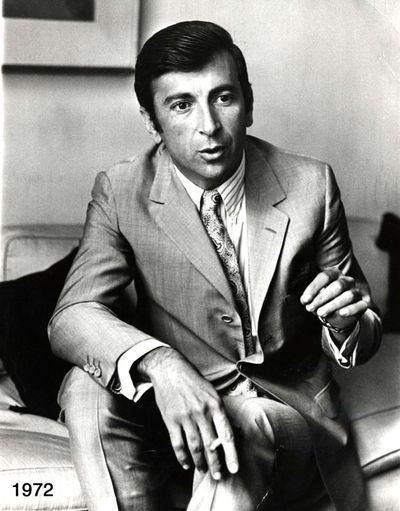In a 2009 interview with the Paris Review, American non-fiction writer Gay Talese described his unorthodox approach to reporting for the New York Times as a young man in the 1950s and 60s: ‘I knew I did not want to be on the front page,’ he said. ‘On the front page you’re stuck with the news. The news dominates you. I wanted to dominate the story.’
It was Talese’s approach to non-fiction that had Tom Wolfe announce him a founder of the American ‘New Journalism’, though Talese hasn’t enjoyed the fame of Wolfe or other more versatile contemporaries such as Norman Mailer and Truman Capote. In his weighty books, Talese tells everyday tales, about the pre-AIDS sexual liberation, the inner workings of New York crime families and the private lives of his colleagues at the Times. His best-known works are still his magazine pieces, collated most recently for Penguin’s Modern Classics series and published in 2011 as Frank Sinatra Has a Cold and Other Essays.
The collection’s title piece was published, in 1966, by Esquire magazine, as were many of Talese’s remarkable articles on fading American celebrities and less famous folk. The collection includes a piece on the heavyweight boxer Floyd Patterson following his defeat in the ring by Sonny Liston, and one on an ageing Muhammad Ali’s meeting with Fidel Castro in Havana in 1996. I’m drawn to the pieces not because of the names attached; on the contrary, many of the names were becoming non-names upon Talese’s investigation of them. It’s Talese’s storytelling craft that appeals, as well as his ability to dig into the psyches of his subjects and tell bigger stories about failure and persistence, about what keeps people going.
There’s also, with the current trend of ‘listicles’ and monitored social-media personalities, the romance of a magazine era now gone, when a publisher might put a writer up at the Beverly Wilshire for an unspecified amount of time with an assignment to get close to Frank Sinatra. In ‘Frank Sinatra Has a Cold’, we get the best of Talese in the opening scene: Sinatra is sitting in the corner of a Beverly Hills nightclub worrying about an upcoming TV special, frustrated by the publicity of his relationship with Mia Farrow. Sinatra’s thoughts aren’t delivered through true dialogue; rather, they’re attributed directly to Sinatra, as is the style of New Journalism, discovered through research and interviews and collated with Talese’s keen observations. And, yes, Sinatra has a cold, which instigates a consideration of one man’s relationship to his public image and the fragility of fame.
I’m fonder of ‘Mr Bad News’, a modest 1966 piece Talese wrote about the obituaries writer at the Times, and of ‘The Loser’ (1964), about Patterson, the boxer, and his psychological struggle to overcome defeat. Talese frames that story within another story of Patterson travelling to his daughter’s school to (unsuccessfully) confront her teenaged bullies. There’s a passage I’ve read over and over in which Talese skips seamlessly between Patterson’s flight to the school (he pilots his own Cessna) and the flight home that followed the Liston fight some years earlier. As with modern short fiction, time becomes a flexible thing as the flights merge and separate.
Then there’s the level of psychological detail Talese is able to divulge in the exchange between Patterson and the bullies:
Patterson saw several white parents standing next to their parked cars; he became self-conscious, began to tap nervously with his fingers on the dashboard. He could not raise his voice without creating an unpleasant scene, yet could not retreat gracefully; so his voice went soft and he said, finally: ‘Look, boy, I want you to stop it. I won’t tell your mother – that might get you in trouble – but don’t do it again, okay?’
Talese has said he’s been accused of fictionalising his accounts when he is, in fact, obsessive about research. In Talese’s 2006 memoir (of sorts), A Writer’s Life, he recalls the number of years he spent watching and talking with Patterson, writing some 30 pieces on him for the Times; the access granted him was that given to a friend, and yet Talese observed with the eye of a writer. (The essay’s title – ‘The Loser’ – however, was chosen by an editor at Esquire.)

In A Writer’s Life, Talese details a number of stories he’s followed to no great end; corners of American life that have engaged his curiosity, sometimes for years, but resulted in no published work. The memoir, in essence, takes Talese as its subject and asks: What causes this writer to keep writing?
The answer is often Talese’s interest in ‘obscurity and failure’ and how people deal with these conditions, an area that remains the domain of fiction writers and has kept Talese largely at the mercy of magazine editors who will (or won’t) indulge him. It enrages me that, as Talese told the Paris Review, in the lead up to a 2008 anniversary issue of Esquire, Talese proposed a follow-up to his 1963 piece on Peter O’Toole (included in the Modern Classics collection) and received no response from the editor. Perhaps that’s simply the writer in me wishing for a kinder time in magazine publishing. Even in his 1997 memoir piece, ‘Origins of a Nonfiction Writer’ (the final piece in the Frank Sinatra collection), Talese recalls being paid more in the 1960s for magazine work than writers were paid in the 90s. And yet what Frank Sinatra Has a Cold and Other Essays achieves is a clean one-two on the side of sensitive investigations of ordinary and private lives – sorely lacking today. Talese makes me want to be a better writer, a better researcher, and a more empathetic person.


